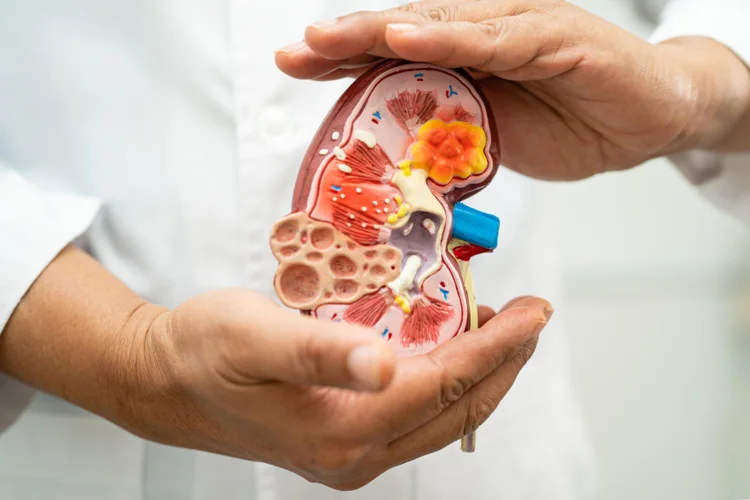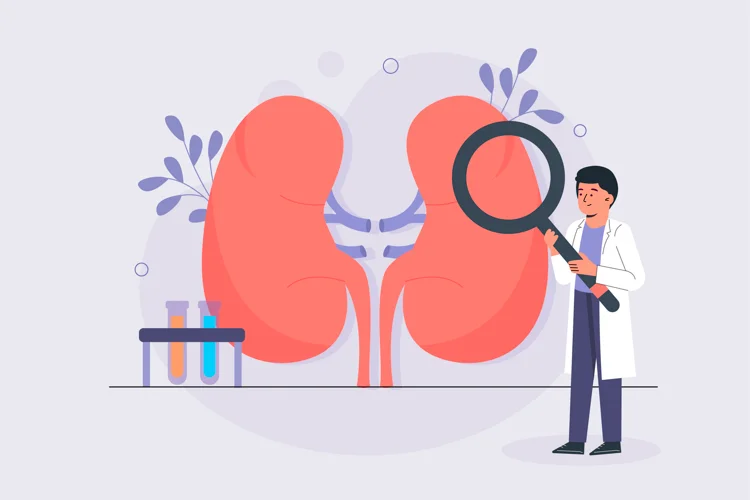Kidney Function Test Singapore
Last updated: Jan 15, 2026


What Is Kidney Disease?
Kidney disease occurs when your kidneys, which are vital organs responsible for removing waste and
excess fluids from your blood, gradually lose their ability to function properly over
time.
When the kidneys become damaged, harmful waste can accumulate in your body and lead to health
problems such as high blood pressure, fluid retention, anaemia, and heart
disease. Early detection of kidney issues can help slow disease progression
and protect your overall health.
Kidney Disease in Singapore
In Singapore, kidney disease is a significant health concern, with high rates of both diabetes - induced and general kidney failure. Here's a closer look at the statistics highlighting the country's battle against kidney disease:
- Singapore has one of the world's highest rates of diabetes-induced kidney failure.
- It ranks second in terms of prevalence, which indicates a large number of existing cases of kidney failure.
- The country also ranks fifth globally in the incidence rate of kidney failure, which reflects the number of new cases diagnosed each year.
- Approximately 500,000 individuals in Singapore suffer from kidney disease, putting them at increased risk of progressing towards kidney failure.
Having diabetes or high blood pressure can increase the chance of developing kidney problems. It's important to know about one's kidney health and get regular check-ups, especially if you belong to groups at higher risk.
Convenient, discreet, and reliable. Book your home screening today.
How To Test for Kidney Function?
Testing for kidney function involves several types of diagnostics that help assess the health of your kidneys:
Blood Test for Kidney Function
Understanding how a blood test for kidney function works is essential for monitoring kidney health. This test provides critical insights into how well your kidneys are filtering your blood and maintaining electrolyte balance.
- Sodium, Potassium, Chloride: These are electrolytes that help regulate nerve and muscle function, hydrate the body, balance blood acidity and pressure, and help rebuild damaged tissue. Abnormal levels of these electrolytes can indicate kidney dysfunction, as healthy kidneys maintain the proper balance of electrolytes in the blood.
- Urea (BUN - Blood Urea Nitrogen): Urea is a waste product formed from the breakdown of proteins. The BUN test measures how much urea nitrogen is present in your blood. High levels can suggest that your kidneys are not effectively removing waste, which could indicate kidney damage or dysfunction.
- Creatinine: This waste product is generated from muscle metabolism and is usually filtered out of the blood by the kidneys. High creatinine levels may be a sign of impaired kidney function.
- Estimated Glomerular Filtration Rate (eGFR): This test calculates how much blood the kidneys filter each minute, adjusted for body size. eGFR is a key indicator of kidney function. Lower values can indicate kidney damage or decreased kidney efficiency.
- iPTH Hormone (Intact Parathyroid Hormone): This hormone helps regulate calcium, phosphate, and vitamin D levels in the blood and bone. It is often measured to evaluate parathyroid function and calcium metabolism disorders, which can be affected by kidney health. Abnormal levels can be associated with kidney disease, as the kidneys are involved in activating vitamin D, which controls iPTH secretion.
Urine Test for Kidney Function
A urine test for kidney function is a simple yet effective diagnostic tool used to assess kidney health. This test is particularly important for detecting early signs of kidney damage and can be easily incorporated into regular health screenings.
- Detection of Protein or Albumin: The presence of protein or albumin in your urine is one of the main markers this test looks for. Protein in the urine, also known as proteinuria, can be an early indicator of kidney damage.
- Glucose Levels: Glucose in the urine can indicate that the kidneys are not reabsorbing sugar effectively, which can be a sign of kidney damage, particularly in the context of diabetes.
- Specific Gravity: This measures how concentrated particles are in your urine. Abnormal levels can indicate that the kidneys are not properly regulating water and salt balance, which is crucial for kidney function.
- Presence of Red Blood Cells (Erythrocytes): Red blood cells in the urine can suggest glomerular damage, a condition where the filtering units of the kidneys are damaged.
- White Blood Cells (Leukocytes): Their presence can indicate an infection or inflammation within the kidneys or urinary tract, affecting kidney function.
Symptoms for Kidney Problem
Kidney problems can manifest through various symptoms, although it's possible to have kidney issues without any noticeable signs. A non-exhaustive list of symptoms include:
- Nausea
- Vomiting
- Reduced appetite
- Tiredness and weakness
- Difficulty sleeping
- Changes in urination frequency
- Reduced mental clarity
- Muscle spasms
- Swollen feet and ankles
- Dry, itchy skin
- High blood pressure that is hard to manage
- Difficulty breathing if fluid accumulates in the lungs
- Chest discomfort if fluid gathers around the heart lining
If you experience any of these symptoms, please consider consulting a doctor. Early detection and treatment can significantly influence the management and outcome of kidney disease.
Prices for Kidney Function Test in Singapore
| Test | Price* |
|---|---|
| Consultation | $49.05 |
|
Renal Profile 1 Sodium, Potassium, Chloride, Total CO2 (Bicarbonate), Urea (BUN), Creatinine, eGFR |
$28.34 |
|
Renal Profile 4 Sodium, Potassium, Chloride, Total CO2 (Bicarbonate), Urea (BUN), Creatinine, eGFR, Calcium, Phosphate, Uric Acid, Urine Microalbumin/Creatinine Ratio |
$47.96 |
|
Renal Profile 5 Glucose, Sodium, Potassium, Chloride, Total CO2 (Bicarbonate), Urea (BUN), Creatinine, eGFR, Calcium, Phosphate, Uric Acid, Urine Microalbumin/Creatinine Ratio, Parathyroid Hormone (iPTH), Haemoglobin, Albumin, Urine FEME |
$80.66 |
|
[Optional] Premium Mobile Blood Drawing at Your Home
Designed for busy professionals, VIP guests, or those who prefer privacy and convenience
|
$54.50 (per location up to 5 pax) |
| Ultrasound Kidney | $152.60 |
^Prices last updated on Jan 28, 2026. While every effort is made to keep pricing information up to date, please contact our team to confirm the latest rates.
Hormone testing packages are also available. WhatsApp us for more information.
How Long Does a Kidney Function Test Take?
A blood test at our clinic usually lasts between 30-60 minutes during off-peak periods. Your results will be ready in 3-5 days and sent to you via email.
Where Can I Do the Kidney Function Test in Singapore?
ATA Medical is conveniently located at three different locations:
- Tanjong Pagar Medical Clinic (Closest MRT: Tanjong Pagar EW15)
- Orchard Clinic (Closest MRT: Orchard Boulevard TE13)
- Jurong Clinic (Closest MRT: Jurong East NS1/EW24)
Miscellaneous
We can also provide home health screening or blood tests at your location at your convenience. Alternatively, you can consider going for our routine and comprehensive health screening packages. Our Royal ($667*) and Jewel ($1415*), and Marvel ($2289*) package have various blood and ultrasound tests bundled with them.
*Prices are NETT and inclusive of GST.
^Prices last updated on
Jan 28, 2026. While every effort is made to keep pricing information up to date, please contact our team to confirm the latest rates.
How Do I Book a Kidney Function Test Appointment in Singapore?
ATA Medical @ Orchard
Nearest MRT: Orchard Boulevard Station (TE13)
Contact Number: 6223 0682
Email: camden@atamed.sg
Opening Hours:
Mon - Fri: 8:30 AM to 12:30 PM, 1:30 PM to 5:30 PM
Sat: 8:30 AM to 12:30 PM
Sun & PH: Closed
ATA Medical @ Tanjong Pagar
Nearest MRT: Tanjong Pagar Station (EW15)
Contact Number: 6223 0682
Email: hi@atamed.sg
Opening Hours:
Mon - Fri: 8:30 AM to 12:30 PM, 1:30 PM to 5:30 PM
Sat: 8:30 AM to 12:30 PM
Sun & PH: Closed
ATA Medical @ Jurong
Nearest MRT: Jurong East MRT Station (NS1/EW24)
Contact Number: 6348 6292
Email: jurong@atamed.sg
Opening Hours:
Mon - Fri: 8:30 AM to 12:30 PM, 1:30 PM to 5:30 PM
Sat: 8:30 AM to 12:30 PM
Sun & PH: Closed


